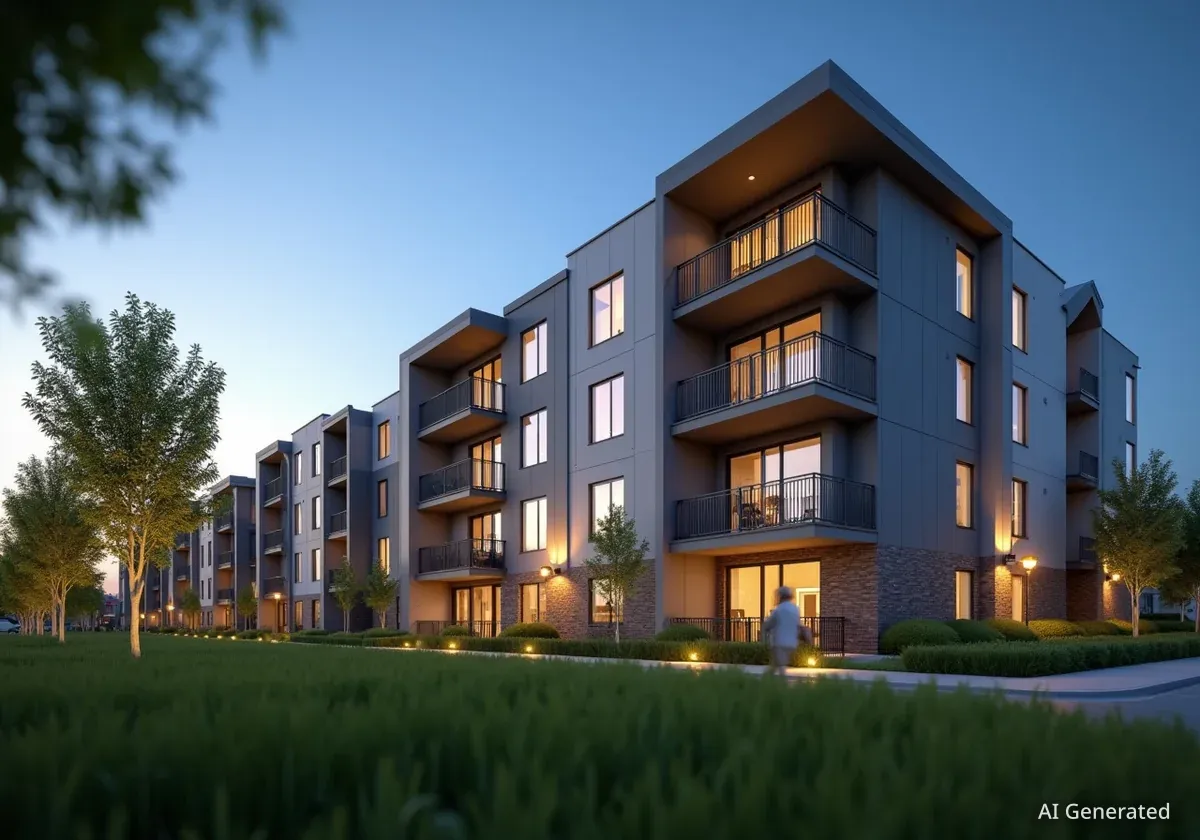A 196-unit affordable housing complex in Rancho Cordova has been sold for $34.5 million to a nonprofit organization. The transaction ensures the property, known as Cordova Village Apartments, will continue to provide below-market-rate housing for residents in the Sacramento metropolitan area.
The buyer, Laguna Beach-based Foundation for Affordable Housing, acquired the property from an affiliate of TDA Investment Group. This sale highlights a growing strategy of using nonprofit ownership to preserve existing affordable housing stock amid rising real estate costs in California.
Key Takeaways
- Property Sale: The 196-unit Cordova Village Apartments at 2201 Zinfandel Drive in Rancho Cordova was sold for $34.5 million.
- Buyer: The Foundation for Affordable Housing, a nonprofit, purchased the complex to preserve its affordability status.
- Seller: The property was sold by an affiliate of TDA Investment Group after completing its investment plan for the site.
- Financials: The sale price equates to approximately $176,020 per unit, a figure influenced by the property's long-term rent restrictions.
A Strategic Acquisition to Preserve Affordability
The sale of Cordova Village Apartments represents a critical move to maintain affordable housing options in a competitive market. The transaction, which closed recently, transfers ownership to an organization dedicated to the long-term preservation of such properties.
Foundation for Affordable Housing is a nonprofit entity that specializes in acquiring and managing affordable housing communities across the country. Its purchase of the Rancho Cordova complex aligns with its core mission of preventing affordable units from converting to market-rate rents, a common risk when ownership changes hands.
The seller, TDA Investment Group, had successfully completed its business plan for the property, which typically involves making improvements and managing the asset for a specific investment period. The sale marks the conclusion of their stewardship and a transition to a mission-driven owner.
Details of the Property
Cordova Village Apartments is a significant residential community in Rancho Cordova. The property offers a mix of one, two, and three-bedroom units, catering to individuals and families with varying income levels.
Constructed in 1985, the complex features amenities common for its era, providing essential housing for the local workforce. Its location offers residents access to employment centers, transportation corridors, and retail services within the greater Sacramento region.
Transaction at a Glance
- Address: 2201 Zinfandel Drive, Rancho Cordova, CA
- Number of Units: 196
- Sale Price: $34.5 million
- Price Per Unit: ~$176,020
- Year Built: 1985
The Financial Mechanics of the Deal
The $34.5 million transaction was facilitated by the Tebo-Gove Group of Marcus & Millichap, a prominent commercial real estate brokerage firm. The firm represented both the seller and procured the buyer, indicating a carefully structured deal designed to meet the objectives of both parties.
"The seller had done a great job of operating the property and completed their business plan, and the buyer is a nonprofit group that will preserve the asset as affordable housing for the long term," said Tony DeLoney, a senior vice president of investments at Marcus & Millichap.
The price per unit of approximately $176,020 is notable. While substantial, this figure is often lower than what a comparable market-rate apartment complex might command in the same area. The valuation reflects the existing affordability covenants, which place legal restrictions on the maximum rent that can be charged to tenants.
Role of Nonprofit Ownership
Acquisitions by nonprofits like the Foundation for Affordable Housing are crucial for the stability of the affordable housing sector. These organizations can access specific financing mechanisms, such as tax-exempt bonds and government grants, which are unavailable to for-profit investors.
This access to specialized funding allows them to acquire properties and maintain them as affordable without the pressure of maximizing returns for shareholders. Their primary goal is social impact and the preservation of community assets.
Broader Context of Sacramento's Housing Market
The sale of Cordova Village occurs against the backdrop of a challenging housing market in the Sacramento region. Like many areas in California, the city and its suburbs face a significant shortage of affordable rental units. According to recent housing studies, demand for affordable housing far outstrips supply, leading to long waiting lists and housing instability for low-income households.
The Affordable Housing Challenge in California
California has one of the most expensive housing markets in the United States. The preservation of existing affordable units is considered a cost-effective strategy compared to new construction. Nonprofit acquisitions prevent the loss of these vital resources when their initial affordability restrictions expire, which is a major concern for housing advocates and policymakers.
Rancho Cordova, a city with a diverse economic base including technology, healthcare, and government-related jobs, requires a robust supply of workforce housing. Properties like Cordova Village are essential for employees who may not be able to afford the area's rising market-rate rents.
The transaction is therefore seen not just as a real estate deal but as a strategic investment in the community's economic health. By keeping these 196 units affordable, the new ownership helps ensure that local workers can live near their jobs, reducing commute times and fostering a more stable community.
Future Outlook for Cordova Village
Under the stewardship of the Foundation for Affordable Housing, Cordova Village Apartments is expected to remain a source of quality, affordable housing for decades. Nonprofit owners typically reinvest cash flow back into the property for maintenance, capital improvements, and resident services.
Residents of the complex are unlikely to see major disruptions. Instead, the change in ownership secures the property's status, protecting them from the possibility of sharp rent increases or displacement that could occur if the property were sold to a market-rate investor.
This sale serves as a model for how public, private, and nonprofit sectors can collaborate to address the housing crisis. It underscores a market trend where mission-driven buyers are stepping in to acquire older affordable properties, ensuring they remain a part of the solution to California's housing shortage.





